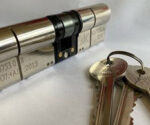DHF receives assured advice on powered garage door safety

For many years, DHF (Door & Hardware Federation), has been advising the garage door industry on the interpretation of the standards for garage door safety and the legislation surrounding their use. A key part of the safety message, relating to the use of ‘hold-to-run’ controls, has proved to be controversial, with some manufacturers and installers choosing to interpret the requirements in different ways.
Having referred the matter to its Primary Authority partner, Nottinghamshire County Council Trading Standards, DHF has now received ‘assured advice’ for manufacturers and installers of garage doors, thereby giving the industry a clear, detailed and officially sanctioned interpretation.
Provided that traders follow the advice correctly, they can be assured that local Trading Standards Officers will have to take account of this and not seek to apply the law in a different way. It is also clear from the advice that some existing interpretations do not comply with the law.
The European standard allows three ways of preventing a closing door from injuring a person:
• Firstly, all contact can be prevented by using technology (such as scanners or light curtains) to detect an obstruction in the door’s path and enable the door to stop and reverse. (This is not achievable with a single, fixed, beam).
• Secondly, doors can be made pressure-sensitive by equipping them with a ‘sensitive edge’, or by using a ‘drive system’ which detects contact with obstacles; in either case, the door stops automatically, reversing as soon as contact with an obstacle is made.
• Thirdly, the user controls the door using a ‘hold to run’ control located close to, and in sight of, the door. The user must maintain constant pressure on the switch to operate the door; releasing the switch will immediately stop the door in the event of danger. However, it must only be possible to operate the ‘hold-to-run’ control in direct sight of the door.
In the past, the third option has often been misunderstood and remote ‘hold-to-run’ controls that were capable of being operated out of sight of the door have been supplied in some cases. The new advice provides clarity on this point, stating that relying on such controls to provide safety, is contrary to the Supply of Machinery (Safety) Regulations 2008 and the Construction Products Regulations 2013.
“Local authority trading standards departments are responsible for the enforcement of the Construction Products Regulations, and also share responsibility for enforcing the Supply of Machinery (Safety) Regulations where machinery for domestic use is concerned,” said General Manager and Secretary of DHF, Michael Skelding. “We hope that this new assured advice from our Primary Authority partner will remove any possible doubt as to the true legal position and, thereby, make a significant contribution to safety.”
Copies of the advice can be obtained by emailing info@dhfonline.org.uk











